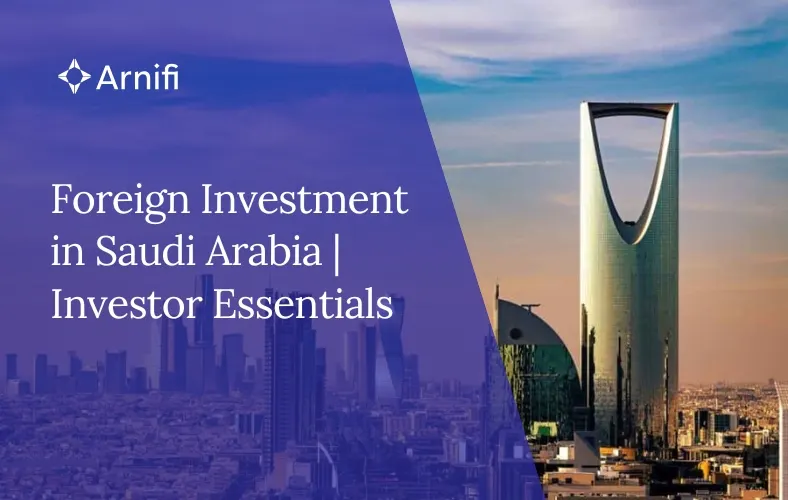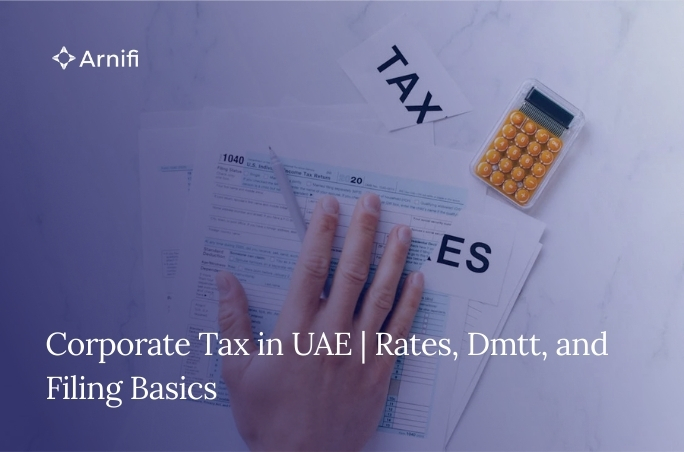Foreign Investment in Saudi Arabia | Investor Essentials
by
Shethana
Sep 15, 2025  6 MIN READ
6 MIN READ

Saudi Arabia is opening wide to foreign investors in 2025, backed by Vision 2030, full ownership options, and booming sectors like IT, manufacturing, and renewables. This guide covers benefits, requirements, costs, and the exact steps to invest successfully.
Table of contents
- 1. Introduction
- 2. Why Saudi Arabia is Attracting Foreign Investment?
- 3. Key Sectors for Foreign Investment
- 4. Types of Entities for Foreign Investors
- 5. The Role of MISA
- 6. Step-by-Step Guide to Foreign Investment in Saudi Arabia
- 7. Estimated Cost of Foreign Investment in Saudi Arabia
- 8. Benefits of Foreign Investment in Saudi Arabia
- 9. Challenges for Foreign Investors
- 10. How Arnifi Helps Foreign Investors?
- 11. FAQs
- 12. Conclusion
1. Introduction
The Kingdom is currently undergoing one of the most profound transformations in its history, and foreign investors are indeed part of this transformation. The Kingdom’s Vision 2030 is driving it further from oil and into several sectors, intending to make the place into a better global hub for logistics, tourism, technology, and even manufacturing, among many others. From supportive legal reforms to mega-projects as ambitious as NEOM and the Red Sea Project, all these make Saudi Arabia most open to international business now.
This is the guide for investing in Saudi Arabia, and of course, why to invest in Saudi Arabia, the important and promising sectors welcoming foreign capital, as well as the steps that one needs to take toward establishing their business presence in 2025.
2. Why Saudi Arabia is Attracting Foreign Investment?
Increasingly, Saudi Arabia’s appeal to foreign investors grows rapidly, and for a good reason:
- Strategic Location: Crossroads of Europe, Asia, and Africa, thus making the country a major logistics and trade gateway.
- 100% Foreign Ownership: Almost all sectors are now open to full foreign ownership, thereby eliminating entry barriers that previously existed.
- Economic Stability: The Kingdom is now a grant-resilient place for investment, since it has trillions of dollars held in sovereign wealth, it is proceeding toward economic diversification.
- Streamlined Business Setup: Setting up an easy business company now with digital portals and government agency assistance, for example, MISA.
3. Key Sectors for Foreign Investment
Saudi Arabia actively promotes foreign direct investment (FDI) in ambitious potential sectors:
- Manufacturing: Industrial machinery to food processing-here’s our guide on registering a manufacturing company in Saudi Arabia.
- Chemical Industry: The King’s petrochemical backbone provides vast opportunities; read our blog on investment in chemicals.
- IT & Technology: Software, AI, and digital transformation are the booming sectors; check out more in our IT company setup guide.
- Renewables & Green Energy: The future of Vision 2030 is sustainability, which creates demand for technology in solar, wind, and hydrogen.
- Retail & Real Estate: Rapid urbanization and a youthful population render these sectors very promising.
To help with global business expansion
make sure you choose us.
Get in touch with our team to find out about our approach
BOOK FREE CONSULTATIONResponse within 24 Hours
Great, please give us a brief detail about your business.
4. Types of Entities for Foreign Investors
Picking out the most appropriate business structure is an element for a successful entry into the Saudi market.
- Limited Liability Company (LLC): Preferred option for small and medium-sized enterprises.
- Joint Stock Company (JSC): Appropriate for big enterprises and those who plan public offerings.
- Branch of a Foreign Company: Ideal way of expanding the operations without the necessity of creating an additional legal entity
- Technical and Scientific Offices: For companies that offer engineering or technical services.
Each one of these structures has different capital, liability, and compliance requirements, so it is important to consult an expert to advise on these issues.
5. The Role of MISA
The Ministry of Investment of Saudi Arabia (MISA) is your central entrance for the investment landscape in the Kingdom. It deals with the:
- issuing foreign investment licenses
- Stating specific requirements for each sector
- Advising the investors about legal compliance.
Without holding MISA, a foreign company cannot legally operate in Saudi Arabia.
6. Step-by-Step Guide to Foreign Investment in Saudi Arabia
Here’s how to establish your presence:
- Choose a Business Activity: As per MISA-approved sectors.
- Apply for a Foreign Investment License via MISA’s online portal.
- Register the Company with the Ministry of Commerce.
- Select Legal Entity (LLC, JSC, Branch, etc.).
- Secure Office Space and Open a Bank Account.
- Process Visas & Labor Setup: Register with GOSI and such other labor portals.
Professional assistance is significantly recommended to ensure a timely and compliant setup.
7. Estimated Cost of Foreign Investment in Saudi Arabia
The costs vary according to the activity, but below is an indication of typical costs:
- MISA License Fee: SAR 2,000 to SAR 62,000, depending on activity type
- Commercial Registration: SAR 1,200 to SAR 2,000 on a recurrent annual basis
- Office Space & Lease: From SAR 20,000/year in key cities
- Bank Deposit & Capital Requirements: Differ by entity type (minimum capital may apply)
- Visas & Labor Setup: SAR 2,000+ per employee (one-off and periodic)
Notwithstanding, manufacturing and chemical industries, among others, would largely differ in their cost implication; thus, it is advised to consult our sector-specific guides.
To help with global business expansion
make sure you choose us.
Get in touch with our team to find out about our approach
BOOK FREE CONSULTATIONResponse within 24 Hours
Great, please give us a brief detail about your business.
8. Benefits of Foreign Investment in Saudi Arabia
Foreign investors enjoy multiple advantages in 2025:
- Ownership in Most Sectors Up to 100%.
- Tax Incentives: 20% corporate income tax and exemptions for special economic zones.
- Government Support: Benefits, grants, and financing available for strategic sectors.
- Regional Access: Saudi Arabia is more than just a launch pad to the wider GCC and MENA markets.
- Vision 2030 Projects: Participate in mega-developments with extremely high potential ROI.
9. Challenges for Foreign Investors
While the way ahead is getting improved, a few huddles with foreign investors are raising awareness:
- Regulatory Updates: It is subject to change and should be checked continuously.
- Cultural Nuances: Business etiquette and local customs make it work for you.
- Competition: High-growth sectors that attract the attention of global players.
- Need for Local Expertise: A trusted consultant can help navigate licensing, compliance, and partnerships with local firms.
10. How Arnifi Helps Foreign Investors?
Harnessing the capability of Arnifi, you can get straightforward assistance to make hassle-free entry into Saudi Arabia, which includes end-to-end support:
- Entity Selection and Structuring
- MISA Licensing Applications and Approvals
- Advisory based on Sector-specific Guidance (e.g, chemicals, IT, and manufacturing)
- Business Setup & Compliance & Employee Visa Services
- Long-term Post-Incorporation Support Services
We understand local regulations well; hence, foreign investors launch with full confidence.
11. FAQs
Q1. Can a foreigner own 100% of a business in Saudi Arabia?
Yes, in most sectors such as IT, retail, manufacturing, and consulting.
Q2. How long does it take to get a foreign investment license?
Generally, 3-6 weeks, depending on business activity and documentation.
Q3. What sectors are restricted for foreign ownership?
A few areas, including oil exploration, security services, and sorts of media activities, remain off limits.
Q4. What is the minimum capital requirement?
This varies per entity type and sector; for LLCs, it can range from SAR 100,000 to SAR 1 million+.
12. Conclusion
Saudi Arabia is fast becoming one of the world’s best destinations to invest in foreign direct investments. It has a stable economy, investor-friendly reforms, and strategic access to regional markets with lots of untapped potential. It’s the right time for businesses stepping into the various horizons of manufacturing, chemicals, or IT; now is the moment to take action.
Ready to invest in Saudi Arabia? Allow Arnifi to usher you through it entirely, from licensing to launch. Contact us today to set a free consultation in your diary.
Top Saudi Arab Packages

Related Articles
Top Saudi Arab Packages



